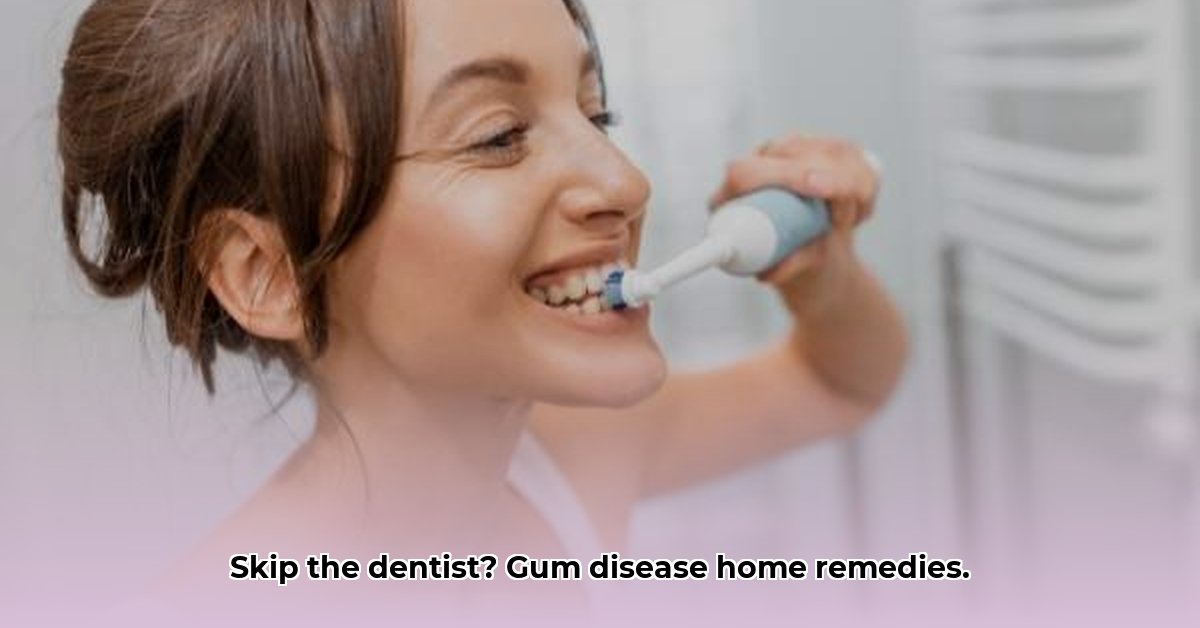Dealing with sore, bleeding gums can be frustrating, and many people seek natural relief. This guide explores effective home remedies that can soothe gingivitis symptoms and improve overall gum health. However, it’s essential to understand home care limitations and when professional dental treatment is absolutely necessary.
Decoding Gum Problems: Gingivitis vs. Periodontitis
Before diving into remedies, let’s clarify the difference between gingivitis and periodontitis. Gingivitis, the initial stage of gum disease, involves gum inflammation, redness, and possible bleeding during brushing. Think of it as a minor irritation. Home remedies can be your first line of defense at this stage. However, if ignored, gingivitis can escalate into periodontitis. Periodontitis is a serious infection damaging the tissues and bone supporting your teeth, potentially leading to tooth loss. At this stage, professional intervention is crucial.
Natural Remedies: Soothing Gingivitis at Home
These remedies can help manage early-stage gingivitis symptoms and support overall gum health:
1. Oral Hygiene: The Essential First Step
Thorough brushing and flossing are non-negotiable. Brushing removes plaque and food particles from tooth surfaces, while flossing cleans between teeth and under the gum line. Use a soft-bristled toothbrush and fluoride toothpaste, brushing gently for two minutes twice daily. Floss at least once a day.
2. Salt Water Rinse: A Soothing Solution
A simple salt water rinse can help reduce inflammation and promote healing. Dissolve half a teaspoon of salt in eight ounces of warm water and swish for 30 seconds, two to three times daily. Avoid excessive salt, which can dry out your mouth.
3. Herbal Mouthwashes: Potential Benefits
Some herbal mouthwashes may offer additional support:
- Lemongrass Oil: A few drops diluted in water create a refreshing rinse.
- Aloe Vera: Swishing with pure aloe vera juice might reduce inflammation.
- Diluted Tea Tree Oil: Its antimicrobial properties could be beneficial.
- Sage: Steeped sage leaves can be used as a rinse.
- Guava Leaf: Boiling guava leaves and using the cooled liquid as a rinse is a traditional remedy potentially offering antimicrobial and anti-inflammatory effects.
(Always test a small area for allergies before using any new ingredient and dilute essential oils properly.)
4. Oil Pulling: An Ancient Practice
Oil pulling involves swishing a tablespoon of oil (coconut or sesame) for 15-20 minutes to potentially “pull” toxins and bacteria from your mouth. While more research is needed, some users find it improves oral hygiene and reduces gum inflammation. Don’t swallow the oil; spit and rinse thoroughly afterward.
5. Topical Treatments: Targeted Relief
Ginseng and curcumin gels may offer localized relief by reducing inflammation. Apply a small amount to your gums for about 30 minutes. Research on their effectiveness is still underway.
6. Nutrition: Fueling Your Oral Health
A balanced diet low in sugar and rich in fruits, vegetables, and whole grains supports healthy gums and teeth. Limiting sugar intake starves the bacteria that contribute to gum disease.
| Remedy | Instructions | Potential Benefits | Cautions |
|---|---|---|---|
| Salt Water Rinse | ½ tsp salt in 8 oz warm water, rinse 30 seconds, 2-3 times daily | Reduces inflammation, cleanses | Excessive use can dry out mouth |
| Oil Pulling | Swish 1 tbsp oil for 15-20 minutes, spit, rinse thoroughly | May reduce plaque, may improve gum health | Jaw soreness, potential for upset stomach |
| Topical Gels | Apply a small amount to gums for 30 minutes | May reduce localized inflammation | Follow product instructions |
When Professional Help is Essential: Recognizing the Limits of Home Care
While home remedies can help manage early-stage gingivitis, they cannot cure periodontitis. If you experience persistent bleeding gums, loose teeth, receding gums, or persistent bad breath, see a dentist immediately. Signs of potential infection like pus or fever also warrant urgent professional care. Your dentist can diagnose the problem and create a personalized treatment plan. Don’t let fear or finances deter you. Many dental offices offer payment plans and accept dental insurance. Ignoring advanced gum disease can have severe consequences.
Causes of Swollen Gums and Home Relief
Swollen gums can have various causes, from plaque buildup and infection to hormonal changes, medications, and underlying health conditions. Simple home remedies such as saltwater rinses, warm/cold compresses, and diluted herbal rinses (use with caution) may offer temporary relief from discomfort. However, if swelling persists or worsens, or if accompanied by other symptoms like bleeding, loose teeth, or signs of infection, seek professional dental care promptly.
Preventing Gum Disease: Long-Term Strategies
Consistent oral hygiene (brushing and flossing), regular dental checkups, a balanced diet low in sugar, and avoiding tobacco products are crucial for preventing gum disease. Oil pulling may also be beneficial, but more research is needed. Early intervention is key to maintaining healthy gums and preventing more serious problems.
Ongoing Research and Evolving Information
Our understanding of oral health is constantly evolving. Ongoing research continues to explore how oral health connects to other systems in the body and might change recommendations in the future. Stay updated, maintain good oral hygiene, consult your dentist regularly, and consider joining reputable dental health organizations or online forums for current information and community support.
- Food Making Kits Bring Easy, Fun Homemade Dishes to Your Kitchen - February 5, 2026
- Cooking Kits Make Mastering New Recipes Fun for Everyone - February 4, 2026
- Leak-Proof Glass Food Containers with Locking Lids Keep Food Fresh - February 3, 2026










